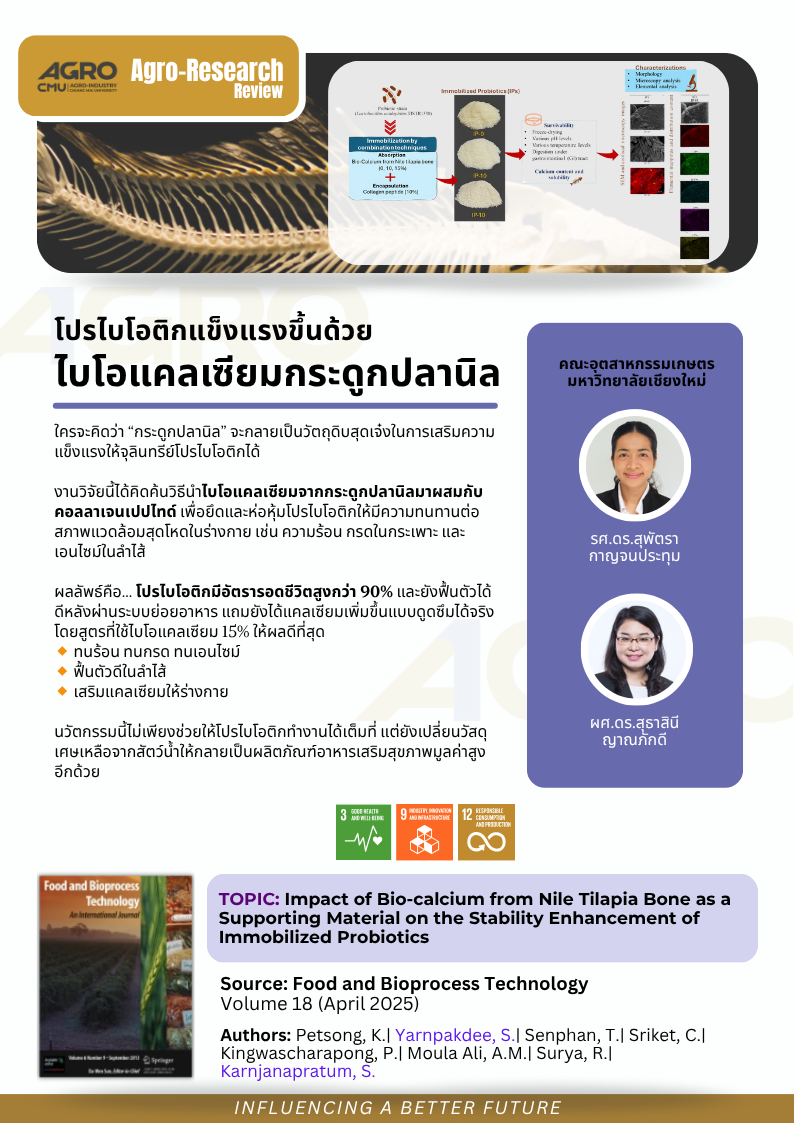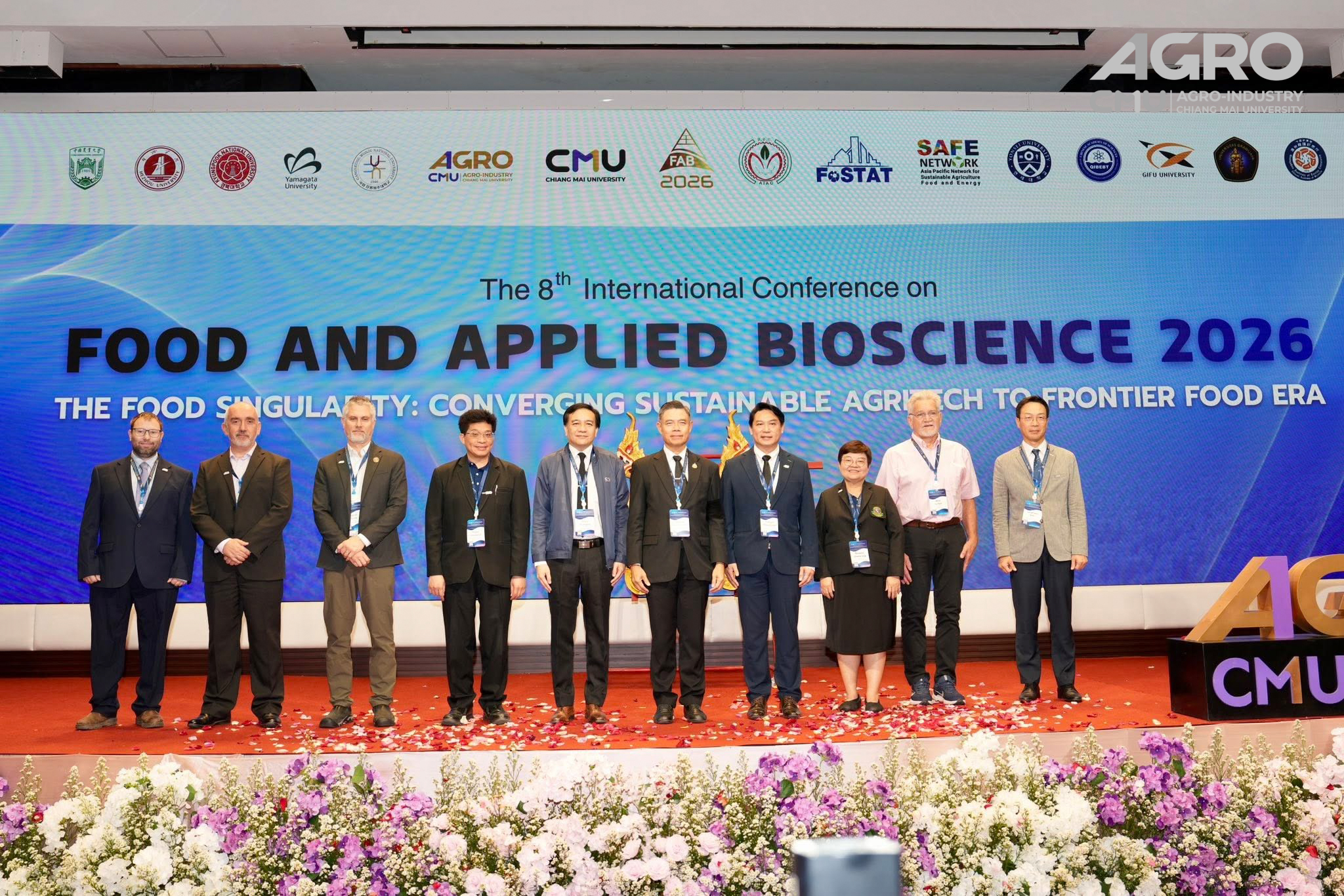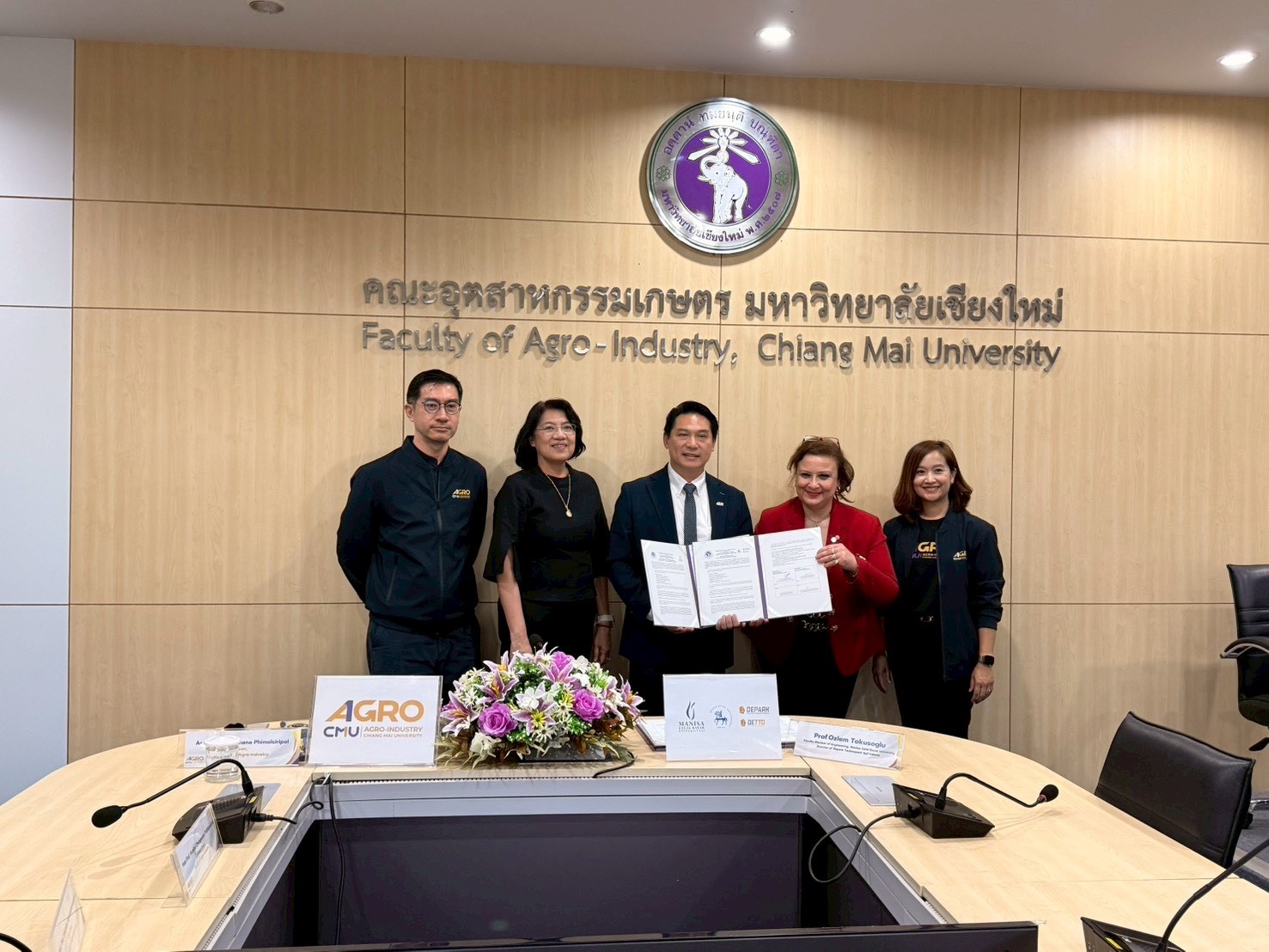
โปรไบโอติกแข็งแรงขึ้นด้วย ไบโอแคลเซียมกระดูกปลานิล
ใครจะคิดว่า “กระดูกปลานิล” จะกลายเป็นวัตถุดิบสุดเจ๋งในการเสริมความแข็งแรงให้จุลินทรีย์โปรไบโอติกได้
งานวิจัยนี้ได้คิดค้นวิธีนำไบโอแคลเซียมจากกระดูกปลานิลมาผสมกับคอลลาเจนเปปไทด์ เพื่อยึดและห่อหุ้มโปรไบโอติกให้มีความทนทานต่อสภาพแวดล้อมสุดโหดในร่างกาย เช่น ความร้อน กรดในกระเพาะ และเอนไซม์ในลำไส้
ผลลัพธ์คือ...โปรไบโอติกมีอัตรารอดชีวิตสูงกว่า 90% และยังฟื้นตัวได้ดีหลังผ่านระบบย่อยอาหาร แถมยังได้แคลเซียมเพิ่มขึ้นแบบดูดซึมได้จริง โดยสูตรที่ใช้ไบโอแคลเซียม 15% ให้ผลดีที่สุด
- ทนร้อน ทนกรด ทนเอนไซม์
- ฟื้นตัวดีในลำไส้
- เสริมแคลเซียมให้ร่างกาย
นวัตกรรมนี้ไม่เพียงช่วยให้โปรไบโอติกทำงานได้เต็มที่ แต่ยังเปลี่ยนวัสดุเศษเหลือจากสัตว์น้ำให้กลายเป็นผลิตภัณฑ์อาหารเสริมสุขภาพมูลค่าสูงอีกด้วย
--
Stronger Probiotics with Bio-Calcium from Nile Tilapia Bones
Who would’ve thought that Nile tilapia bones could become a powerful ingredient to boost probiotic stability?
This innovative study developed a method to combine bio-calcium from tilapia bones and collagen peptides for adsorbing and encapsulating probiotics. Thus the probiotics can withstand harsh conditions inside the body—like heat, stomach acid, and digestive enzymes.
The result? These enhanced probiotics showed over 90% survival rate and excellent recovery after passing through the digestive system. Plus, they delivered significantly more absorbable calcium, especially with the 15% bio-calcium formula, performing best.
- Heat-resistant, acid-resistant, enzyme-resistant
- Great recovery in the gut
- Good source of calcium
This breakthrough not only helps probiotics work more effectively, but also transforms aquatic animal waste into valuable health-promoting supplements.
--
Topic: Impact of Bio-calcium from Nile Tilapia Bone as a Supporting Material on the Stability Enhancement of Immobilized Probiotics
Authors: Petsong, K.| Yarnpakdee, S.| Senphan, T.| Sriket, C.| Kingwascharapong, P.| Moula Ali, A.M.| Surya, R.| Karnjanapratum, S.
Abstract:
This study presented the potential of bio-calcium powder (BC) from Nile tilapia bone on enhancement of probiotics (Lactobacillus acidophilus) stability as supporting material in probiotic immobilization and novel nutritive resource, particularly calcium. Combined immobilization techniques of absorption using BC at different concentrations (0, 10, and 15%) and encapsulation using fish collagen peptide (CP) (10%) were applied. Immobilized probiotics (IP) were investigated for resistance through various adverse conditions, including freeze-drying, severe pH and temperature levels, and gastro-intestinal tract (GI) conditions. After freeze-drying, all IPs showed resistance with > 90% survivability. Under various pHs, all samples revealed non-significant differences on cell survival under neutral and alkaline conditions throughout the tested incubation period (P > 0.05). Notably decreased survivability was detected in IP with BC compared to other samples, especially under acid condition. IP with 10 and 15% BC (IP-10 and IP-15) showed higher stability to thermal condition (55 °C) with increased incubation time, compared with those without BC (IP-0). After GI digestion, IP with BC reveals a better survivability with greater recovery ability, compared with IP-0 (P < 0.05). Calcium solubility increased with BC level in a dose-dependent manner (P < 0.05). Based on morphology and microscopy analysis, IP with BC illustrated cells attached to the rough surface of BC, which was coated with collagen peptide. Elemental mappings and distribution content suggested BC could be a great supporting material and calcium resource, particularly IP-15. Therefore, the absorption by BC together with encapsulation by collagen peptide could render a highly stable immobilized probiotic and a good calcium resource.
Keywords: Bio-calcium; Encapsulation; Immobilization; Probiotics; Supporting material; Survivability
View at publisher: https://link.springer.com/article/10.1007/s11947-025-03837-2
#อกมช. #agrocmu #CMU




